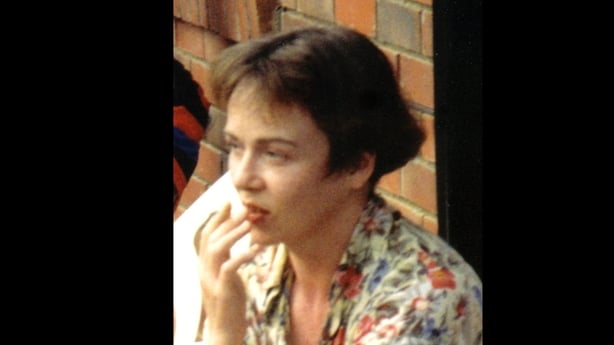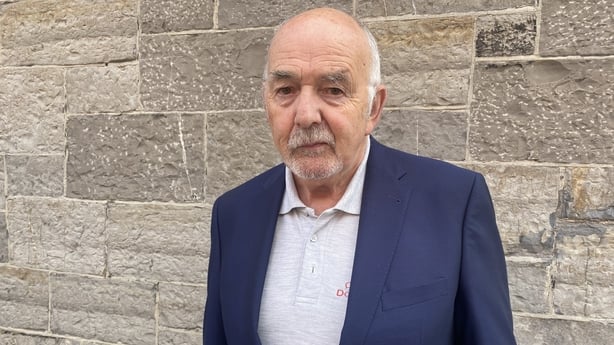Tomorrow marks the 30th anniversary of the disappearance of Eva Brennan.
The last time her family saw her was when she visited her parents' home in Rathdown Park in Dublin 6 on 25 July 1993.
Eva went missing just a day shy of four months after American Annie McCarrick, however her disappearance received much less publicity.
"I always considered Eva as one of the forgotten missing persons" former detective sergeant of the Garda Cold Case Unit, Alan Bailey, told RTÉ News.
"If you ask anybody who disappeared in 1993, they'll always mention Annie, but Eva seems to have been forgotten," he said.
To her family Eva, who was 39 at the time, will never be forgotten, but they too share the frustration that her case failed to get more attention, both by the press and by gardaí.

It is believed she returned to her apartment in Rathgar after visiting her parents' home, as the jacket she was seen wearing that day was found there.
Eva's red shoulder-bag, with keys and other personal documents inside it, were gone when her father and brother broke in to her apartment on 27 July, concerned that they had not heard from her.
There has been no recording sighting of Eva Brennan in the 30 years since.
A search of the RTÉ News library showed that her disappearance was not reported on at the time, or indeed since, until today.
However a documentary featuring the case called 'True Lives: Missing' made by Graph Films for RTÉ was broadcast in 1998.
"When Eva went missing we decided, because we had no help from the police, that we would take matters into our own hands," Eva's late sister Colette McCann said in an interview for the documentary.
She described them making posters, doing media interviews and driving around "all over the place".
"Six of us (siblings) were out looking for Eva's body basically" she said, "at that time we didn't know what to do, we hadn't a clue... we just had to crawl our way along in the dark and that's exactly what we did."
Colette and Eva's parents died without ever finding out what happened to Eva.

Surviving family members told RTÉ News that it was weeks before gardaí came to the family home at Rathdown Park after they reported Eva's disappearance to them.
They recall that it was longer still before gardaí came to fingerprint Eva's apartment.
There were two schools of thought as to what might have happened.
One was that Eva Brennan had been abducted and murdered, the other was that she had died by suicide.
Her family believe it is the former, and that gardaí were slow to act initially because they believed it to be the latter, as Eva had had depression in the past.
Gardaí have confirmed that Eva's disappearance remains a live investigation, and gardaí in Terenure Garda Station renewed their appeal to the public "for any information which may bring this investigation to a conclusion".
We need your consent to load this rte-player contentWe use rte-player to manage extra content that can set cookies on your device and collect data about your activity. Please review their details and accept them to load the content.Manage Preferences
Mr Bailey welcomed the renewed appeal saying that questions around the case "remain unanswered".
In 1998 Operation Trace was set up by former garda commissioner Pat Byrne, to investigate the disappearance of six women in Leinster between 1993 and 1998.
They were Annie McCarrick, Jo Jo Dullard, Fiona Pender, Fiona Sinnott, Ciara Breen and Deirdre Jacob.
Eva Brennan's case was one of a number of other cases later taken on by the team.
Operation Trace was wound up in 2003 and was subsumed back into the National Bureau of Criminal Investigation (NBCI).
Mr Bailey, who was the National Coordinator for Operation Trace, believes Eva's case "absolutely" deserves the same interrogation as the original six cases.
"The big thing for us was that there were no obvious 'push/pull factor' in Eva's disappearance," Mr Bailey explained.
He said that there was "no reason why she should leave home", with no new relationships or anything like that discovered in her background.
"It's the leaving part, without any cause or reason, that would make you very suspicious," he said.
"The fact that Eva hasn't been located and there has been no trace of her to date... it is deserving of the same commitment of all the other cases," Mr Bailey said.
Mr Bailey said that the renewed appeal could help bring new information to light that might shed light on what happened to Eva Brennan.
"It's very important. Over the years loyalties and maybe fear of people, all those things change over the passage of years and it could happen that somebody knew something, but for some reason, misplaced loyalty, fear or anything else, didn't come forward and I'd like to say that it's never too late to come forward," Mr Bailey said.







